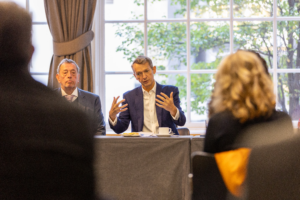Monash University unveils its first free online courses on FutureLearn
Learners from around the world can register now to learn about Creative Coding and The Science of Medicines from leading academics at the world-leading Australian university
London, 24th February 2014: Monash University’s first two massive open online courses (MOOCs) will teach computer programming for creative design, and the science behind medicines used to treat major health issues such as heart disease, depression, diabetes and pain control. ‘Creative Coding’ and ‘The Science of Medicines’ will launch on FutureLearn, the free, online social learning platform.
Those signing up for the two new courses will join an international community of learners on FutureLearn, which has been built to support learning through conversation. ‘Creative Coding’ and ‘The Science of Medicines’ will incorporate FutureLearn’s strong storytelling elements, guiding learners through a compelling narrative made up of videos, articles, real life case studies and other rich media elements.
‘Creative Coding’ will begin on 2nd June and ‘The Science of Medicines’ on 1st September 2014. Learners can register their interest in these courses now on www.futurelearn.com.
The new titles bring to 46 the number of free online courses added to FutureLearn since its launch in September 2013, and builds on the website’s growing portfolio of Science, Technology, Engineering & Maths (STEM) and Art & Design offerings.
Simon Nelson, CEO of FutureLearn, said, “Our partnership with Monash University gives learners around the world access to some of the highest quality teaching from a truly global educator. The new courses will be a valuable addition to the FutureLearn portfolio, providing vital, practical knowledge to improve their lives and careers.
“At FutureLearn, we want to support our partners – both in the UK and internationally – to become world-leading digital practitioners. The two courses from Monash University promise to be really enjoyable learning experiences, combining topical subjects with a strong compelling narrative, for our growing community of learners.”
Monash University Pro Vice-Chancellor (Learning and Teaching) Professor Darrell Evans said the expansion of the University’s course offerings provided exciting new educational opportunities for students.
“We are very excited about our partnership with FutureLearn. With its focus on student engagement and social learning, we see FutureLearn as the perfect fit for Monash MOOCs. This is an opportunity to make Monash courses open to the broadest audience, further enhancing our international reach,” Professor Evans said.
Professor Evans said the courses not only reflect important strengths of the University, but were well-suited to the MOOC format.
“The Creative Coding course is truly multidisciplinary, cutting across information technology and art and design. Being a course that will encourage creativity, we see the FutureLearn platform as the ideal way to facilitate a vibrant exchange of ideas amongst students from the broadest mix of geographical and cultural backgrounds,” Professor Evans said.
“The Faculty of Pharmacy and Pharmaceutical Sciences is a world leader in research and education, and so was a natural choice to develop one of our first MOOCs. “The Science of Medicine” course will showcase the innovative ways the Faculty presents pharmacology but will do so in a way of immediate practical value to the students taking the course.”
About the courses
Creative Coding (6 weeks)
Aimed at artists, designers, architects, or indeed anyone interested in creativity, this course is a practical introduction to computer programming as a creative discipline. The free online course will teach ‘algorithmic thinking’ – ways of conceptualising and modelling the world that in turn inform the creative programming of computers. The course will also examine how a number of leading artists and designers work creatively with computers and robotics, examining their design process and the ideas that drive them.
Starting with simple processes learners will be shown how to create increasingly complex and nuanced visual and sonic artworks using generative programming techniques. During the course, learners will also debate some of the interesting questions raised by generative art; can a computer be independently creative? Who is the author of a work of generative computer art, the programmer or the program? How is our understanding of art and creativity changed by technology? Does the computer bring anything that is really new to art and design?
Learners will be taught how to program for creative applications, so a background in programming is not assumed.
The Science of Medicines (6 weeks)
This course has been designed for people affected by a serious health issue, the people who care for them and anyone who is interested in the clever science behind medicines.
Major health issues face the world’s growing population and medicines are a primary pillar to effect better health. The course will teach the science of key medicines used to manage heart disease, depression, diabetes, pain control and smoking cessation.
Each week, learners will study a new medicine and health area, starting by looking through the eyes of an affected patient. They will learn the mechanics of a disease and how it affects the world’s population. Learners will then delve into the science of the medicine to explore its chemistry, how it works in the body and why it is formulated in a certain way to become the medicine you see on the pharmacy shelf.
To date, FutureLearn has attracted almost 250,000 registered learners and over 400,000 individual course registrations, since the launch of its beta site in September 2013. Analysis of data from the eight pilot courses to run on the social learning platform show high levels of learner engagement and participation. 86% of learners are active – marking at least one step along the course as complete – while 50% complete steps in multiple weeks, and 25% still do so in the final week. 34% of learners are using the social features of the social learning platform, with their comments becoming a rich source of learning material for other users.
FutureLearn is wholly owned by The Open University. The website combines the best elements of the social web with The Open University’s 44 years of expertise in distance and open learning.


